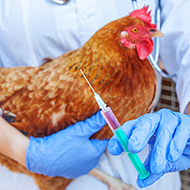
Models could enable the development of effective vaccines.
Tools that will enable researchers to forecast the spread of deadly poultry viruses are being developed by scientists at the University of Edinburgh's Roslin Institute.
In a first-of-its-kind study, researchers aim to build computer models that can predict how Marek's disease transmits from bird to bird and how it evolves to become more harmful. It is hoped the models could enable the development of effective vaccines and control strategies to prevent outbreaks.
Professor Andrea Doeschl-Wilson, personal chair in animal disease genetics and modelling at the Roslin Institute explains: “This is the first study that investigates the combined influence of vaccination, host and viral genetics on how viruses are transmitted and evolve to higher virulence.
“We hope that our models can inform future control strategies to help tackle the health, welfare and economic burden of Marek’s disease as well as other poultry viruses.”
Marek's Disease is currently controlled by 'imperfect' vaccines, with losses costing the poultry industry billions of pounds every year. In the study, researchers will use data from some 7,000 birds to assess how the virus evolves as it transmits up to 10 times.
The team will compare effects in vaccinated and non-vaccinated chickens, and in chickens that differ in their genetic resistance to the virus. They will then identify common variations in the genetic code of the birds and viruses that are associated with higher virulence and to the ability of the viruses to evade immune surveillance.
Finally, scientists will compare the genetic makeup of the most virulent variations of the viruses - thos ethat have been spread 10 times - with the original virus that infected the first chickens. All of this data will then feed into computational models that simulate the spread and evolution of the disease.



 The Federation of Independent Veterinary Practices (FIVP) has announced a third season of its podcast, Practice Matters.
The Federation of Independent Veterinary Practices (FIVP) has announced a third season of its podcast, Practice Matters.